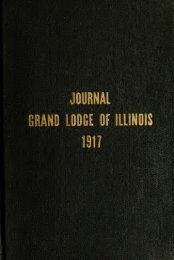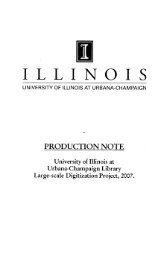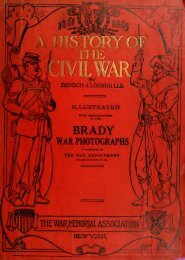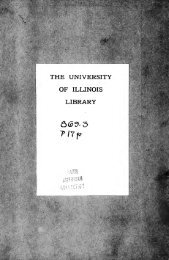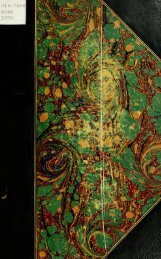328 FIELDIANA: ANTHROPOLOGY, VOLUME 56Other objects <strong>in</strong> the <strong>Tikchik</strong> collection that could be consideredas be<strong>in</strong>g of Russian orig<strong>in</strong> are the fragment of kaol<strong>in</strong> pipe stem, thecast iron kettle fragments, a copper r<strong>in</strong>g, and perhaps the brass kettlefragments. There may be others, but it is clear that the bulk of theimported manufactured goods from the site belong to the Americanperiod and were, for the most part, obta<strong>in</strong>ed from the traders whosucceeded the Russian-American Company at the mouth of the NushagakRiver. It would seem, then, that the Russian <strong>in</strong>fluence at <strong>Tikchik</strong>,at least <strong>in</strong> terms of material culture, was not great. This isperhaps not as difficult to understand as might at first appear. Theperiod of Russian <strong>in</strong>fluence was, after all, relatively short and thereare <strong>in</strong>dications that it lacked <strong>in</strong>tensity. In a discussion of a similarsituation along the Kuskokwim River at the same time, it has beenpo<strong>in</strong>ted out that s<strong>in</strong>ce the Russians came <strong>in</strong>to the <strong>in</strong>terior of southwesternAlaska for the purpose of expand<strong>in</strong>g their fur trade, theywere always few <strong>in</strong> number and very circumspect about their deal<strong>in</strong>gswith the people. They had no force to back up their positionsuch as they possessed decades earlier when establish<strong>in</strong>g themselves<strong>in</strong> the Aleutian Islands and along the coast of southeastern Alaska.Seldom <strong>in</strong> southwestern Alaska did they settle <strong>in</strong> an occupied <strong>village</strong>and it seems certa<strong>in</strong> that they made little or no attempt to <strong>in</strong>terfere<strong>in</strong> the affairs of the various <strong>village</strong>s where they ma<strong>in</strong>ta<strong>in</strong>ed contactfor purposes of trade (Oswalt, 1963, pp. 106-107) ,It should be emphasized once aga<strong>in</strong> that <strong>Tikchik</strong> was one of themost remote <strong>village</strong>s of the Nushagak River region and was probablyvisited only seldom by Russians, either traders or missionaries. Infact, it is altogether likely that Alexandrovski Redoubt may havebeen <strong>in</strong> existence for more than 20 years before the <strong>Tikchik</strong> residentsbegan to visit it with any degree of regularity. If that were <strong>in</strong>deedthe case, then the total period of even moderate Russian <strong>in</strong>fluence onthe <strong>community</strong> would have been no more than 25 years. Thus it isperhaps not surpris<strong>in</strong>g that whatever Russian <strong>in</strong>fluence might havebeen noticeable <strong>in</strong> the material culture was easily swamped out bythe succeed<strong>in</strong>g 40 years of more <strong>in</strong>tensive contact with Americantraders, cannery workers, prospectors, etc.An extremely significant, but less tangible, result of the Russianpresence <strong>in</strong> the Nushagak River region was the <strong>in</strong>troduction of Christianityto the peoples of the area. Furthermore, the Russian OrthodoxChurch played a role at least equal to that of the Russian-AmericanCompany <strong>in</strong> open<strong>in</strong>g up the country and <strong>in</strong> expos<strong>in</strong>g the people tooutside <strong>in</strong>fluences. Christianity was <strong>in</strong>troduced to the Nushagak
VANSTONE: TIKCHIK VILLAGE 329River region at the time of the construction of Alexandrovski Redoubtand there is evidence that dur<strong>in</strong>g the next ten years FedorKolmakov baptized a small number of Eskimos who were employees<strong>in</strong> the service of the Company at the redoubt (Barsukov, 1886-1888,vol. 2, p. 36). Father Ivan Veniam<strong>in</strong>ov, one of the first Orthodoxmissionaries <strong>in</strong> Alaska, visited the redoubt <strong>in</strong> 1829 from Unalaska andbaptized 13 <strong>in</strong>dividuals, the first Eskimos north of the Alaska Pen<strong>in</strong>sulato receive baptism. He returned <strong>in</strong> 1832 and ordered the constructionof a small chapel. Between 1832 and 1838 Kolmakovcont<strong>in</strong>ued to baptize people and <strong>in</strong> the latter year Gregory Golov<strong>in</strong>,Veniam<strong>in</strong>ov's successor at Unalaska, visited the redoubt, adm<strong>in</strong>isteredthe sacraments to 53 of those baptized by Kolmakov and baptized52 new converts (Barsukov, 1886-1888, vol. 2, pp. 37-38).In 1840 Veniam<strong>in</strong>ov was named bishop of the Diocese of Kamchatka,the Aleutian and Kurile Islands and one of his first acts wasto request permission from the Holy Synod to establish a mission atAlexandrovski. This was authorized and <strong>in</strong> 1841 Deacon I. Petel<strong>in</strong>,Veniam<strong>in</strong>ov's son-<strong>in</strong>-law, was orda<strong>in</strong>ed a priest and appo<strong>in</strong>ted totake charge of the Nushagak mission (DRHA, vol. 1, pp. 385-386).The number of Christians at Nushagak <strong>in</strong> 1842 was about 200 anddur<strong>in</strong>g the next three years as many as 400 additional Eskimos mayhave been baptized (Tikhmenev, 1939-1940, pt. II, pp. 297-298).Father Petel<strong>in</strong> also seems to have widened the scope of his activitiesto <strong>in</strong>clude the region north of the redoubt. It is likely that heascended the Nushagak on several occasions and it is known thathe visited the Kuskokwim for the first time <strong>in</strong> 1843 and receivedmany Eskimos <strong>in</strong>to the church (Zagosk<strong>in</strong>, 1967, p. 285).We have already noted that the first reference to <strong>Tikchik</strong> <strong>in</strong> thevital statistics of the church at Alexandrovski Redoubt occurs <strong>in</strong> 1847when two middle-aged men presumably visited the redoubt and werebaptized. Unfortunately, it is impossible to say with certa<strong>in</strong>ty whena missionary first visited the <strong>village</strong> but there are <strong>in</strong>dications <strong>in</strong> thevital statistics that this may have taken place as early as 1850, <strong>in</strong>which case it would have been Hieromonk Nikolai from NikolaevskiRedoubt on Cook Inlet who first established direct contact with <strong>Tikchik</strong>.He <strong>in</strong>cluded the Nushagak <strong>in</strong> his area of jurisdiction <strong>in</strong> 1847when Father Petel<strong>in</strong> left the mission follow<strong>in</strong>g the reduction of Alexandrovskito an od<strong>in</strong>ochka <strong>in</strong> 1846. Hieromonk Nikolai resided atAlexandrovski for a year <strong>in</strong> 1850-1851 (Barsukov, 1897-1901, vol. 1,p. 371; DRHA, vol. 1, p. 247). <strong>Tikchik</strong> cont<strong>in</strong>ues to be mentionedmore or less regularly <strong>in</strong> the statistics until 1882 but it seems virtu-
- Page 2 and 3:
-;«.>*;>'-^!^fe'*«*w*^=LIBRARY OF
- Page 6 and 7:
. •>.. «-;•* - . Ti'-mtfT^-iif
- Page 12 and 13:
Ivan Ishnook, the last Tikchik surv
- Page 14 and 15:
Library of Congress Catalog Card Nu
- Page 16 and 17:
Listof IllustrationsIvan Ishnook, t
- Page 18 and 19:
216 FIELDIANA: ANTHROPOLOGY, VOLUME
- Page 20 and 21:
218
- Page 22 and 23:
c^^NtKushaqakfOdinochka-, Lake,.Lna
- Page 24 and 25:
Tikchik Village inHistoryThe meanin
- Page 26 and 27:
224 FIELDIANA: ANTHROPOLOGY, VOLUME
- Page 28 and 29:
226 FIELDIANA: ANTHROPOLOGY, VOLUME
- Page 30 and 31:
228 FIELDIANA: ANTHROPOLOGY, VOLUME
- Page 32 and 33:
230 FIELDIANA: ANTHROPOLOGY, VOLUME
- Page 34 and 35:
232
- Page 36 and 37:
234 FIELDIANA: ANTHROPOLOGY, VOLUME
- Page 38 and 39:
236 FIELDIANA: ANTHROPOLOGY, VOLUME
- Page 40 and 41:
238 FIELDIAN A: ANTHROPOLOGY, VOLUM
- Page 42 and 43:
240 FIELDIANA: ANTHROPOLOGY, VOLUME
- Page 44 and 45:
242 FIELDIANA: ANTHROPOLOGY, VOLUME
- Page 46 and 47:
244 FIELDIANA: ANTHROPOLOGY, VOLUME
- Page 48 and 49:
246 FIELDIANA: ANTHROLPOLOGY, VOLUM
- Page 50 and 51:
248 FIELDIANA: ANTHROPOLOGY, VOLUME
- Page 52 and 53:
25a FIELDIANA: ANTHROPOLOGY, VOLUME
- Page 54 and 55:
252 FIELDIANA: ANTHROPOLOGY, VOLUME
- Page 56 and 57:
254 FIELDIANA: ANTHROPOLOGY, VOLUME
- Page 58 and 59:
256 FIELDIANA: ANTHROPOLOGY, VOLUME
- Page 60 and 61:
258 FIELDIANA: ANTHROPOLOGY, VOLUME
- Page 62 and 63:
260 FIELDIANA: ANTHROPOLOGY, VOLUME
- Page 64:
262 FIELDIANA: ANTHROPOLOGY, VOLUME
- Page 67 and 68:
CollectionsIn this chapter the arti
- Page 69 and 70:
VANSTONE: TIKCHIK VILLAGE 267type i
- Page 71 and 72:
Plate 3, Ground Stone and Antler Ar
- Page 73 and 74:
VANSTONE: TIKCHIK VILLAGE 271edge.
- Page 75 and 76:
Plate 4. Bone and Antler Artifacts.
- Page 77 and 78:
VANSTONE: TIKCHIK VILLAGE 275isobvi
- Page 79 and 80: Plate 6. Bone, Antler, Bark and Lea
- Page 81 and 82: VANSTONE: TIKCHIK VILLAGE 279One of
- Page 83 and 84: VANSTONE: TIKCHIK VILLAGE 281is fla
- Page 85 and 86: VANSTONE: TIKCHIK VILLAGE 283be not
- Page 87 and 88: VANSTONE: TIKCHIK VILLAGE 285Thus t
- Page 89 and 90: VANSTONE: TIKCHIK VILLAGE 287row sl
- Page 91 and 92: VANSTONE: TIKCHIK VILLAGE 289of the
- Page 93 and 94: 14 15Plate 8. Metal, Glass and Impo
- Page 95 and 96: VANSTONE: TIKCHIK VILLAGE 293have b
- Page 97 and 98: VANSTONE: TIKCHIK VILLAGE 295Of the
- Page 99 and 100: VANSTONE: TIKCHIK VILLAGE 297(Fonta
- Page 101 and 102: Plate 9. Metal Artifacts. 1. Ovate-
- Page 103 and 104: Plate 10. Metal Artifacts. 1. Flint
- Page 105 and 106: VANSTONE: TIKCHIK VILLAGE 303barrel
- Page 107 and 108: VANSTONE: TIKCHIK VILLAGE 305size n
- Page 109 and 110: VANSTONE: TIKCHIK VILLAGE 307histor
- Page 111 and 112: VANSTONE: TIKCHIK VILLAGE 309Crow V
- Page 113 and 114: ^ HIS--I rj 1-H ^1-H i-H (M 1-H --(
- Page 115 and 116: VANSTONE: TIKCHIK VILLAGE 313wait,
- Page 117 and 118: Plate lib. Locally-made Pottery. La
- Page 119 and 120: VANSTONE: TIKCHIK VILLAGE 317Stone,
- Page 121 and 122: VANSTONE: TIKCHIK VILLAGE 319Much m
- Page 123 and 124: VANSTONE: TIKCHIK VILLAGE 321centur
- Page 125 and 126: VANSTONE: TIKCHIK VILLAGE 323how pe
- Page 127 and 128: VANSTONE: TIKCHIK VILLAGE 325River
- Page 129: VANSTONE: TIKCHIK VILLAGE 327list j
- Page 133 and 134: VANSTONE: TIKCHIK VILLAGE 331suit o
- Page 135 and 136: VANSTONE: TIKCHIK VILLAGE 333Bristo
- Page 137 and 138: VANSTONE: TIKCHIK VILLAGE 335mercia
- Page 139 and 140: VANSTONE: TIKCHIK VILLAGE 337estima
- Page 141 and 142: Spring and summerVANSTONE: TIKCHIK
- Page 143 and 144: Interpretations and ConclusionsThe
- Page 145 and 146: VANSTONE: TIKCHIK VILLAGE 343United
- Page 147 and 148: VANSTONE: TIKCHIK VILLAGE 345p. 230
- Page 149 and 150: VANSTONE: TIKCHIK VILLAGE 347forest
- Page 151 and 152: VANSTONE: TIKCHIK VILLAGE 349could,
- Page 153 and 154: them.VANSTONE: TIKCHIK VILLAGE 351T
- Page 155 and 156: VANSTONE: TIKCHIK VILLAGE 353Cobb,
- Page 157 and 158: VANSTONE: TIKCHIK VILLAGE 3551902.
- Page 159 and 160: VANSTONE: TIKCHIK VILLAGE 3571967.
- Page 161 and 162: (M 1-1 (M i-H 00 C^t«J1-4 t-^(M 1-
- Page 163 and 164: '—'4J'•c3o^ MoS =3 -^«—•CO
- Page 165 and 166: g>'JSaCL,fiu
- Page 167 and 168: -4->. 0)—t-H «D —ll-H.3(>J 1-1
- Page 169 and 170: _^.c.a>'Ja.XIg^.c c C03o
- Page 174: Publication 1057





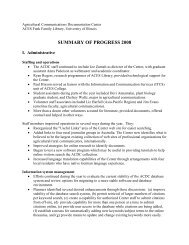
![La musa galante [microform] - University Library](https://img.yumpu.com/50760818/1/190x222/la-musa-galante-microform-university-library.jpg?quality=85)


